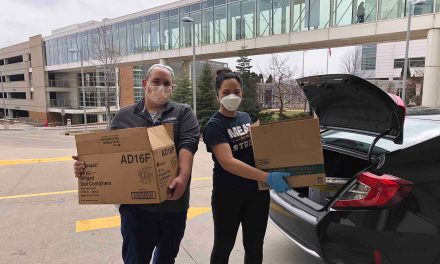
The recent suicide of Lorna Breen, a New York City emergency room doctor who had suffered from COVID-19 and had been traumatized by treating other patients who had contracted the virus, needs to serve as a wakeup call for all first-responders and front-line healthcare professionals.
“These heroes are saving lives, but that can come with a cost to their own well-being,” said Chad Wetterneck, PhD, a licensed clinical psychologist and clinical director of trauma recovery services at Rogers Behavioral Health. “This pandemic is unprecedented in our lifetime, and the entire medical community needs to be cognizant of the symptoms of posttraumatic stress disorder (PTSD).”
Wetterneck said the symptoms of trauma or posttraumatic stress disorder are different for each individual based on the specific experience, but can include: scanning for danger in safe situations; experiencing irritability, anger or aggression; withdrawn behavior; recurrent nightmares or flashbacks of the event, feeling as though the life-threatening situation is present again; typically avoiding places, people, activities or objects that are reminders of the event; difficulty sleeping; tending not to go out in public; feeling depressed and alone; engaging in risky behaviors such as substance use, gambling, driving fast, and such.
“The change in mood and thoughts can look a little different for each person. For many, people report feeling more anger, shame and a lot of fear. Others find themselves emotionally ‘numbed,’” Dr. Wetterneck said. “Imagine 90 percent of the workforce is told to stay at home, but you are asked to be there and work harder, and you yourself may be at risk.”
In the COVID-19 pandemic, front-line healthcare professionals are the last people to comfort their dying patients, adding to the traumas those workers are experiencing, Dr. Wetterneck said.
Dr. Wetterneck said first-responders and front-line healthcare staff need to monitor themselves and each other for the symptoms of PTSD and seek professional help when needed, rather than trying to cope with the traumas on their own over time.
As emergency rooms and other health care organizations become increasingly overwhelmed, Rogers is supporting communities by providing highly specialized, evidence-based mental health and addiction treatment that is critically needed at this time.
“It’s long been said that necessity is the mother of invention. Rogers already had made in-roads in implementing the electronic delivery of mental health care. But the necessity of responding to the COVID-19 pandemic provided us a catalyst to expedite and greatly expand our telehealth services,” said President and Chief Executive Officer Pat Hammer.














